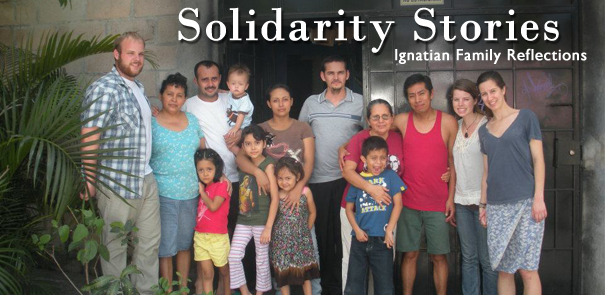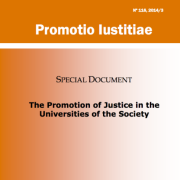Just Sustainability: Dreaming the Possibilities Can Be Exciting and Fun | Update #3
 The following is one in a series of updates that Jim Hug, S.J. is providing from the Just Sustainability: Hope for the Commons Conference at Seattle University from August 7-9, 2014.
The following is one in a series of updates that Jim Hug, S.J. is providing from the Just Sustainability: Hope for the Commons Conference at Seattle University from August 7-9, 2014.
The conference stimulated a great many reflections and questions – more than one “blog-ful” it turns out. So here are a couple – hopefully with more to follow soon.
Dealing with Hope and Hopelessness…
It was a frequently recurring theme throughout the conference: How can we keep hope alive? The data revealing the kind of future climate change is preparing for the human community over the next century, the already-emerging, massive threats that are so serious and extensive that they are almost impossible to even imagine – they too often crush hope. People can only listen to so much and then very natural human defense mechanisms kick in: “You can see the wall go up right in front of your eyes!” We need to learn to respect and work with these very real human limitations in ourselves as well as others.
A number of things can be said – though none of them is in the end adequate. Here are some that emerged during the conference conversations:
- These are immense and important issues. Most of us older folks have known for a long time that we will not see the long-term outcomes of our justice efforts. We need to face that reality and accept it. But our blessing is to be part of the struggle in solidarity with really good people, working – to the best of our lights – in union with God’s Spirit.
- More and more young people “get” the problems and have great energy and resilience. As one speaker put it, they don’t yet know what they can’t do – so they need to be bold – and can be.
- Another participant, a local high school student, urged the participants not to try to protect the young – “We need to hear and we want to hear the truth and grapple with how to address it.” Youth energy and idealism are powerful – and have usually been at the forefront of successful social change efforts.
- Sometimes it helps to simply focus on something manageable and doable – and get a sense of achievement to rekindle motivation and energy. “Sometimes you just have to be able to see (and touch and hear and smell and taste) that you’ve accomplished something!”
- One thing this conference showed – and publications like Yes! Magazine have as their mission to broadcast: There is a lot more going on in our networks across the country and around the world than is recognized or realized. Hope is fermenting almost everywhere.
- More connections need to be made, more networking organized. We need to think more structurally and strategically to organize all this energy and experimentation to be more effective. Who knows when it will come together globally and erupt to take us past another important milestone?! Social change is rarely gradual and linear.
- Coming together in communities to share our hopes, fears, and struggles provides the foundational strength for continuing to confront the challenges.
What gives you hope? What feeds your hope and renews your spirit for the mission? We need to be vulnerable and honest in our sharing so we nurture each other to move forward together.
Universities: Awakening Giants…?
As I indicated above, I come away with a renewed sense that there is a huge amount happening and great possibilities are emerging on campuses across the country. Can it all come together to present a courageous and prophetic witness to the nation? Can Jesuit universities as a network provide the outspoken moral leadership so badly needed in our time?
Student organizations are forming to urge their schools to disinvest from fossil fuels and reinvest in clean energy. The University of Dayton has made that commitment; students at Seattle University are pushing for a similar commitment but meeting pushback. What a great educational opportunity for all involved – including administrators and Board members. Couldn’t this movement catch fire on campuses across the country? Think how much learning would go on, how much training could shape future transformational leaders! Could ISN light those sparks? How many billions of dollars would this kind of collaborative action leverage? Surely the nation would take notice. Divestment was eventually an effective tool in the global effort to end apartheid in South Africa. Could it be effective for us in this our time, in dealing with these our critical issues?
Universities are major respected institutions in their local communities. Can they leverage that credibility and moral authority more effectively? The members of a university’s Board of Directors are often key influential actors in their cities and states. Some are national leaders in their own fields. Many of them, if they are truly informed and wise businesspeople, know the climate issues and other ecological crises we face as a human community. They have to know them for the sake of the future of their own enterprises. Is their Board membership providing them formation in Ignatian values and discernment? AJCU has put great energy and resources into board development programs in recent years. The presidents and Board Chairs met with the Jesuit Fr. General Nicolás last fall. Can those experiences be parlayed into a national board member collaboration on these issues? Who can or should lead this effort?
Or what about the food served on our campuses? Is it organic? Sustainably grown? Locally sourced? What is its carbon footprint? Might it have been raised on large factory farms like those whose runoff fed the algae in Lake Erie and made the water of Toledo, OH undrinkable? (If you didn’t hear that story last week, Google “Toledo water” and explore what you find.) Who wants that sort of thing going on under our noses? Isn’t it like finding the telltale marks of child labor and sweatshops on our alma mater T-shirts and other merchandise?
Teachers are developing new courses to bring deeper understanding to the issues related to climate change. These issues pervade practically every discipline in the curriculum. We Jesuits claim with pride our commitment to transformational education. Can we move further and faster in reorganizing our programs of study to serve social, economic, political and cultural transformation in the face of our current climate crises?
Business schools are also acknowledging their crucial role in transforming our global economy into one that reverences and cares for creation, works within the ecological limits of Earth, and meets the needs of the global common good as well as building healthy economic institutions and graduating successful business students. Do they have a sense of the urgency of the crisis we face and are they responding appropriately? The International Association of Jesuit Business Schools held its 20th Annual World Forum in Seoul, South Korea in late July. It was entitled Mobilizing the Worldwide Jesuit Network: Collaboration for Global Sustainability. Will there be fora on your campus for your business school professors to talk about the Forum and indicate what they brought home from it? And how they hope to mobilize that collaboration for global sustainability?
As a key element in its mission integration work, Xavier University in Cincinnati has engaged staff at all levels – from grounds keepers to executives – in training as “Sustainability Ambassadors” trained to tell anyone who will listen what their departments are doing to further the university’s sustainability goals. Most Jesuit universities now have Sustainability Officers of some type. I hope – and presume – that they are networking under the leadership of AJCU so that best practices can spread rapidly and bear public witness to local communities of the grave importance with which this major institutions with great moral credibility take the climate crisis and our moral responsibility to build global and just sustainability for all.
Dreaming the possibilities can be exciting – and fun! Can we make them happen?
James E. Hug, S.J., has a long history working in social ethics and social justice advocacy in the Catholic community. He served 24 years as the President of the Center of Concern, a Washington, DC based social justice institute rooted in Catholic social tradition, working for greater economic, social, and ecological justice globally. He holds a doctoral degree in Christian ethics from the University of Chicago and a master’s degree in Christian spirituality from St. Louis University.
Fr. Hug’s research has focused on issues of faith and economic justice and he has lectured and directed workshops throughout the U.S. and in Europe, Asia, Africa, and Australia. Currently he serves as sacramental minister for the Adrian Dominican Sisters and writes on issues of spirituality for social transformation in these difficult times. His blog, “Truth that does Justice,” can be found on the website for the Dominican Center: Spirituality for Mission, www.dominicancenter.org.
Past publications have included Catholic Social Teaching: Our Best Kept Secret, Social Revelation: Profound Challenge for Christian Spirituality, and Tracing the Spirit: Communities, Social Action, and Theological Reflection. Jim has also written chapters for Globalization and Catholic Social Thought: Present Crisis, Future Hope and The Pastoral Circle Revisited: A Critical Quest for Truth and Transformation.
Fr. Hug’s research has focused on issues of faith and economic justice and her has lectured and directed workshops throughout the U.S. and in Europe, Asia, Africa and Australia. He was the editor of the Center of Concern’s “Catholic Social Teaching: Our Best Kept Secret, author of Social Revelation: Profound Challenge for Christian Spirituality,” and the editor of “Tracing the Spirit: Communities, Social Action, and Theological Reflection.” Jim has also written chapters for “Globalization and Catholic Social Thought: Present Crisis, Future Hope” and “The Pastoral Circle Revisited: A Critical Quest for Truth and Transformation.”










Leave a Reply
Want to join the discussion?Feel free to contribute!